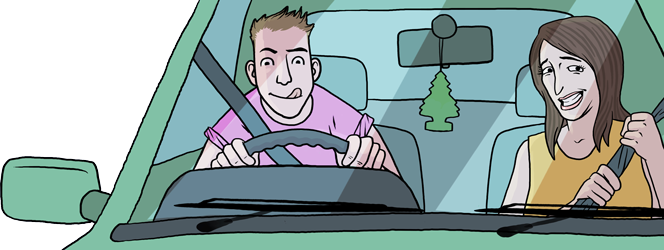
Choosing a first car
Whoever's paying, the biggest concern is going to be cost. The cost of the car, the cost of insurance, tax, fuel... Crikey.
A lot of those things are related though, so there are a few points to keep in mind when you're looking for the right first car for your child.
-
Suitability
Yes, price matters. But don't compromise on safety for that. Your child needs a car they can drive comfortably, so make sure you consider things like power steering and seat adjustability. They'll probably have had their driving lessons in a fairly modern car, so a much older model could be a difficult transition.
You might find the best thing to do is fine a similar model to the one they learned in. This cuts out the distraction of getting used to new controls and an unfamiliar ride.
-
Insurance
Insurance often costs more than the car. There's a big reason for this: the cost of a crash is much more than a replacement Fiat Punto. Injury to people can cost millions in ongoing care.
Young drivers crash more than older drivers, so this risk is reflected in insurance premiums. Telematics insurance helps to bring this cost down, but picking the right car can also help.
Choosing a car for cheaper insurance:
- Go for a car in insurance group 1 or 2
- Keep engine size to 1.4 or below
- Look out for modifications - an insurer sees these as a higher risk
- Avoid the cute vintage Mini - rarer parts make for bigger premiums
Be sure to get a quote before you buy a car - you don't want a nasty surprise! Get some get more advice on choosing car insurance for your child.
-
Tax
- SEAT Mii (£20 after)
- Hyundai i10 (£20 after)
- Skoda Citigo (£20 after)
- Volkswagen Up! - (£20 after but the BMT model is tax-free!)
-
Safety
One of the key reasons that road deaths have decreased so much is that cars are getting steadily safer. While it's tempting to go for an old car because "they'll just knock it anyway", more modern cars are a lot better equipped for avoiding that knock in the first place.
Sure, extra safety features can be expensive but try our favourite small cars with big technology as a start - the 2014 Volkswagen Polo has automatic post-collision braking to reduce the impact of a crash, city emergency braking for avoiding bumps in traffic and an alert system that senses when a driver is in danger of falling asleep.
-
Maintenance
Aside from the cost of insurance, buying an older car is a false economy when it comes to maintenance too. You might get a beaten up old bumper car for £100 off someone down the pub but it could cost you big to keep it on the road.
Buying a second hand car is absolutely fine but don't jump at a bargain without being 100% sure it's going to run well and suit a new driver.
-
Fuel efficiency
Some smaller cars are tax-free or have a free first year, due to low emissions. Lots of the cars in insurance group 1 are tax free or very low tax, so that's a win-win.
Cars with a zero-tax first year
Another pro in the newer car column. A lot of the newer small cars are amazingly fuel efficient where their older brothers and sisters fall down.
Autocar's 2015 list of the most economic cars includes some young driver favourites: the Vauxhall Corsa, the Peugeot 208 and the Renault Clio - all coming in at between 85mpg and 94mpg.









